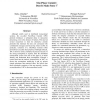Free Online Productivity Tools
i2Speak
i2Symbol
i2OCR
iTex2Img
iWeb2Print
iWeb2Shot
i2Type
iPdf2Split
iPdf2Merge
i2Bopomofo
i2Arabic
i2Style
i2Image
i2PDF
iLatex2Rtf
Sci2ools
ICPADS
1998
IEEE
1998
IEEE
One-Phase Commit: Does it make Sense?
1 Although widely used in distributed transactional systems, the so-called Two-Phase Commit (2PC) protocol introduces a substantial delay in transaction processing, even in the absence of failures. This has led several researchers to look for alternative commit protocols that minimize the time cost associated with coordination messages and forced log writes in 2PC. In particular, variations of a One-Phase Commit (1PC) protocol have recently been proposed. Although efficient, 1PC is however rarely considered in practice because of the strong assumptions it requires from the distributed transactional system. The aim of this paper is to better identify and understand those assumptions. Through a careful look into the intrinsic characteristics of 1PC, we dissect the assumptions underlying it and we present simple techniques that minimize them. We believe that these techniques constitute a first step towards a serious reconsideration of 1PC in the transactional world.
Alternative Commit Protocols | Distributed And Parallel Computing | ICPADS 1998 | So-called Two-phase Commit | Transactional System |
| Added | 04 Aug 2010 |
| Updated | 04 Aug 2010 |
| Type | Conference |
| Year | 1998 |
| Where | ICPADS |
| Authors | Maha Abdallah, Rachid Guerraoui, Philippe Pucheral |
Comments (0)

